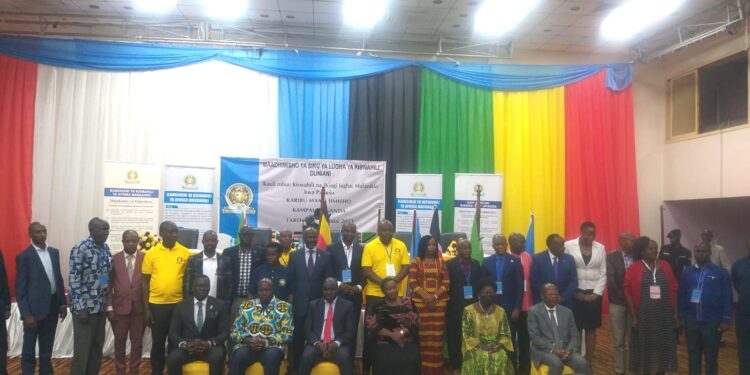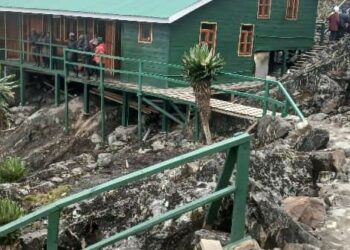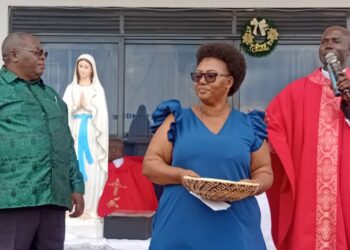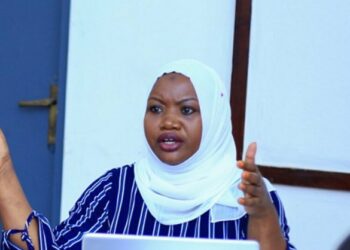The President of Uganda HE. Gen. Yoweri Museveni has disclosed that comprehension of Kiswahili language to mastery among principalities of East Africa will open up hidden opportunities in regional and continental trade.
Museveni made this profound revelation through Prime Minister Rt. Hon. Robinah Nabbanja, during the last day of the 2nd East African Community World Kiswahili Language celebrations on July 7th 2023 at Hotel Africana, Kampala.
Organized by the East African Kiswahili Commission under the theme “Kiswahili and Multilingualism, achieving more Together”, the high-profile event was attended by a multitude of East African citizens with representatives from all seven members of the bloc across different divides. These included: high-end diplomats and commissioners, ministers, permanent secretaries, legislators from the East African legislative assembly (EALA) and several academicians.
“The language is used to facilitate trade and commerce in the region. Therefore, I call upon the East African Community and Africa at large to embrace the use of Swahili language . It is a de-tribalist dialect that can unite us all and facilitate regional trade,” President Museveni revealed.
“The unity of East Africa and the rest of Africa is geared towards achieving three strategic goals. And these are: one prosperity through economic integration, security through political integration and fraternity by exploiting the historical and ethnic linkages among our people,” he added.
Prosperity, he said is achieved through making significant strides towards attaining a common market for the whole bloc, that is further ameliorated through the use of a common language, which is Kiswahili in this case.
“Prosperity is supported by having big markets when companies, all families produce goods or services. How many consumers will buy these products? If a product does not have enough buyers, the business will fail.”
It is important to note that the last day of the World Kiswahili celebrations was officiated with a procession as officials from the East African Community and Uganda’s Ministry of East African Affairs participated in a march from Constitutional Square in Kampala to Hotel Africana, where the official celebrations were held.
The procession, which was also embraced by personnel from Uganda Police Force and the Army, was used to raise awareness about Kiswahili as an official language in the region.
The event at Hotel Africana was held to discuss ways and means of developing and promoting Kiswahili for regional integration and sustainable development, through bringing together various stakeholders to share experiences and contemporary insights on Kiswahili. It was also aimed at senstizing stakeholders on the growing role, importance and opportunities of Kiswahili at the national, regional and global scene.
While making his remarks, the State Minister for Higher Education Hon. Dr. John Chrysestom Muyingo amused the congregation, when he said that Uganda’s efforts in promoting the usage of Kiswahili in East Africa are unprecedented, to the extent of subjecting ministers to compulsory dialect lessons every Monday.
“Our cabinet every Monday, they are subjected to four Swahili lessons. And I’ve been trying to understand whether this is happening in any country in the world. It’s only in Uganda, where cabinet ministers start the day with this way with Swahili lessons. Isn’t that wonderful people?” Hon. Muyingo said.
As the crowd reacted with an overwhelming ovation to his remarks, Dr. Muyingo went on to say that Ugandans are seriously reading, and a quite number of them have or are pursuing PhDs in Swahili, in a number of learning institutions.
Rt. Hon. Rebecca Kadaga, the first deputy Prime Minister and Minister for East African Affairs on her part extolled every Kiswahili stakeholder in the country, who has worked tooth and nail to see to it that the entire population embraces the dialect.
“We are celebrating the international day of Swahili but for me the highlights is that Swahili has been spoken in Uganda as for me, that’s a landmark, that’s been a big achievement. I want to thank all those who have participated I think we have got over 300 people here,” Hon. Kadaga said.
She also implored every Ugandan who knows how to speak Kiswahili to work tirelessly and teach those who do not know, in addition to inclulcating in them a positive perception about the dialect.
“The other thing we have achieved Prime Minister is the awareness. This week alone. I’ve received so many messages from Ugandan all over the country offering to help market Kiswahili in Uganda, so that is an achievement”
The 2nd World Kiswahili day was declared by 41st General Assembly of UNESCO in Nov. 2022. The World Kiswahili Day was first observed in Zanzibar, on 6th and 7th July 2022 and the council of ministers guided that it be celebrated on a rotational basis in all partner states.
The three-day event also provided an opportune moment to promote the speaking and comprehension of Kiswahili in Uganda, through leveraging the dialect stakeholders which include: policy makers, researchers, teachers and the media to try to work out mechanisms of instilling love for the language among the citizenry, most especially the youth.
Five key priority areas in the national Kiswahili promotion road map for Uganda
- Establishing the national kiswahili council to coordinate and regulate Kiswahili activities. Cabinet seating in December approved the Uganda National kiswahili Bill 2022 with the guidance and support of Hon. First Deputy Prime Minister Rt. Hon. Rebecca Kadaga. It was presented to the Parliamentaty council for debate and soon will be enacted into law, and it will among other things prescribe the implementation of various activities, including recommendations to promote the language.
- Communication, sensitization and advocacy on the use of Kiswahili to change peoples attitudes and mindset.
- In terms of capacity building, the Ministry has coordinated the development of a comprehensive plan and budget which has been presented to cabinet, that has guided on the way forward. It stipulates mechanisms for the provision of scholarships to youth and Kiswahili scholars, coming up with short specialized courses for the business community and establishing Kiswahili language resource centers, which will be done in collaboration with sister ministries, Kiswahili Commission in Zanzibar, Ministry of Education and Ministry of Gender.
- Translation and intepretation to extend the language to people in all forms. The Ministry will coordinate the provision of translation and interpretation services to promote the use of Swahili in various EAC activities with in the country in liason with Kiswahili Commission Secretariat based in Zanzibar.
- Developing strategic partnerships and collaborations through mapping and engaging various stakeholders, to promote Kiswahili in the private sector and civil society.
Do you have a story in your community or an opinion to share with us: Email us at editorial@watchdoguganda.com













